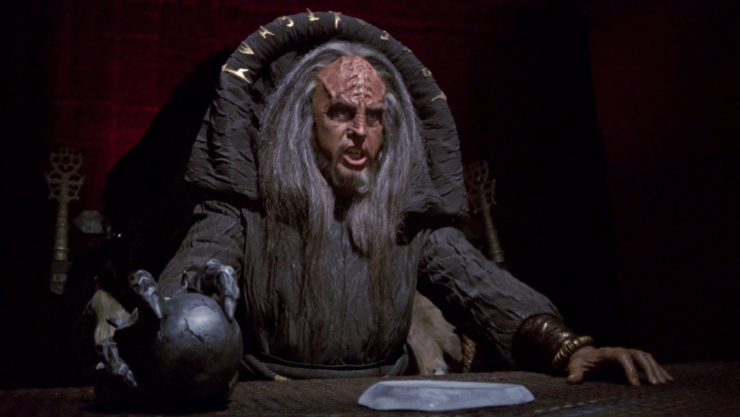“Judgment”
Written by Taylor Elmore & David A. Goodman
Directed by James L. Conway
Season 2, Episode 19
Production episode 045
Original air date: April 9, 2003
Date: unknown
Captain’s star log. We open in a Klingon courtroom, where Archer is accused of aiding enemies of the empire. He’s brought to a cell before the trial starts, where Phlox is allowed to examine him—apparently, T’Pol convinced the Klingons that he needed treatment for a potentially infectious disease.
Under the guise of a checkup, Phlox fills him (and the viewer) in: Archer was arrested, and both Starfleet and the Vulcan High Command are attempting to free him through diplomatic channels, thus far to no avail. Archer makes it clear he doesn’t want Enterprise to do anything stupid to try to rescue him, like start a war.
Archer then meets his advocate, an older Klingon named Kolos. Archer is confused by Kolos’ unwillingness to even talk to Archer about what happened, and he’s actively annoyed by Kolos doing almost nothing during the trial itself.
The prosecutor, Orak, has only one witness. Captain Duras—or, rather, Weapons Officer Duras, as he’s been demoted. When he was a captain, he was in command of the Bortas, and he encountered Enterprise with a rebel ship in tow. They fought, a fight leading to a planet’s rings, and while there, Enterprise detonated plasma with a torpedo, confusing Bortas’ sensors enough to enable the Starfleet vessel to escape.
According to Duras, Archer identified his ship as a battle cruiser, said he didn’t know the Klingon chancellor, and claimed to support the rebels in their fight against the empire. Archer tries to point out to Kolos and to the magistrate that these are lies (and the viewer knows certainly that the first two are), but he is ordered to remain quiet, an order that is backed up with a bunch of painstiks.
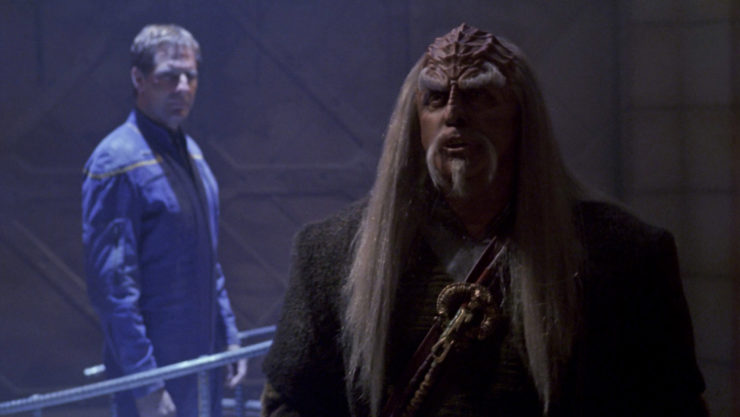
When Archer wakes up in his cell, and tries and fails to eat his meal of raw targ meat, Kolos arrives to offer him a deal: if Archer reveals where he took the rebels, he won’t be sentenced to death. Archer again insists that the people Enterprise rescued were not rebels, and he won’t give them up to be hunted down.
Kolos starts to open up to Archer, longing for the good old days when Klingon courts were an open forum for justice and honor. Now it’s just a vehicle for the warrior class to maintain their superior position in Klingon politics.
Back in court, Kolos asks to enter testimony. Orak objects, but while such is no longer the custom, the actual law that allows an advocate to enter evidence at any time before judgment is still on the books. The magistrate allows Archer to be questioned, though Orak interrupts regularly.
According to Archer, Enterprise answered a distress call from a group of twenty-seven aliens. There were more than fifty when they left their homeworld—their ship is falling apart and their food and water supplies are tainted. Phlox treats them, and their leader explains that some aliens they’d never seen before (Klingons) showed up on their homeworld. The Klingons said they were now part of their empire, and they looted and pillaged the world, promising to return with food and supplies and other nifty things. They never did come back, and so these aliens decided to escape and find another world. They’re not rebels, they’re refugees.
The Bortas showed up, and, contrary to Duras’ testimony, Archer did not fire first, and in fact he tried very hard to find a diplomatic solution. But Duras wasn’t interested in talking and fired. Archer—who had had Reed modify a torpedo when Bortas first showed up on their scanners—runs to the planetary rings, where the battle plays out as Duras had testified.
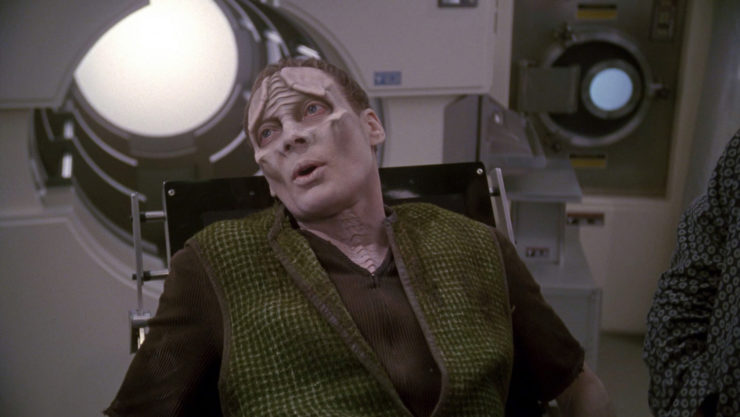
Kolos then declares that Archer is guilty of meddling in Klingon affairs—as he already has done twice before, bringing Klaang to the High Council to report on Suliban sabotage, and again to rescue the Somraw from a gas giant. He is not guilty of treason or aiding rebels, he’s just guilty of sticking his nose where it doesn’t belong.
The magistrate considers the evidence, and still finds Archer guilty, but in deference to his past service to the empire, he is not condemned to death, but instead to life imprisonment on Rura Penthe. Kolos is disgusted by this—the maximum life expectancy of a prisoner on that ice planet is a year, and Archer probably won’t last that long. It’s still condemning him to death, but cloaking it in a bullshit layer of “mercy.” The magistrate finds Kolos in contempt, and sentences him to a year at Rura Penthe.
On Enterprise, T’Pol orders Mayweather to leave orbit. Tucker wants to try to rescue Archer, but T’Pol says that isn’t wise—and probably won’t work. They have to try more diplomatic solutions. When Tucker points out that diplomatic solutions didn’t work, T’Pol says there’s a few they haven’t tried yet…
Kolos struggles on Rura Penthe, as he is old and the work is backbreaking. Archer tries to help him, and that just gets both of them hit with painstiks. When new prisoners arrive, one of them is Reed in disguise, there to rescue him. T’Pol was able to use her connections from her days in the Ministry of Security to find a guard who could be bribed. Archer offers to take Kolos with him, but he can’t fight to make the empire a more honorable place if he’s a fugitive. He’s determined to live out his sentence and carry on the work he started in Archer’s trial. When Archer reminds him that a year is a long time on Rura Penthe, Kolos counters that he, unlike the other prisoners, has something to live for…
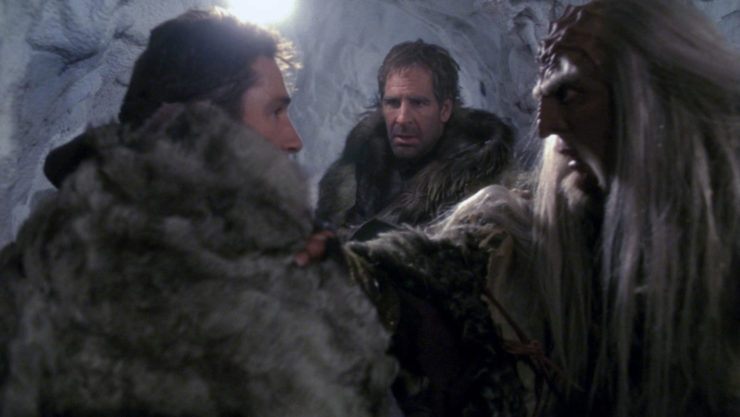
Can’t we just reverse the polarity? The planetary rings have methane ice, isolytic plasma, and diamagnetic dust. The Berman-era Trek productions’ obsession with the adjective “isolytic” without having the first clue what it really means continues unabated. Apparently, in this context, “isolytic” means “can ignite with a torpedo”…
The gazelle speech. Hilariously, we never do find out exactly how the Klingons arrested Archer…
I’ve been trained to tolerate offensive situations. T’Pol is able to use her connections from her prior job in the Ministry of Security to find a good prison guard to bribe. Because she’s just that awesome.
Florida Man. Florida Man Refuses To Give Up On Captain.
Optimism, Captain! Phlox is able to talk privately with Archer in his cell by mentioning the possibility of an infectious disease, which gets the guard to back the hell up.
Good boy, Porthos! It is not made clear who is taking care of Porthos while Archer is in jail, which is a major flaw in the script…
Qapla’! We learn in this episode that the warrior caste has the greatest status in the empire—which remains true for the next two centuries—but that it wasn’t always like that, and that Klingons used to value other professions more than they do now, but these days it’s all warriors this and soldiers that. These kids today, with their music and their hair…
More on this later… This is the first chronological appearance of a Klingon court, Klingon painstiks, and Rura Penthe, not to mention the House of Duras, all of whom have been seen in previous shows that take place later.
I’ve got faith…
“What is it?”
“Bloodwine. It should make the wait more pleasant.”
“What’s it the blood of?”
“Don’t feel badly if you can’t stomach it.”
“I didn’t say that…”
–Archer and Kolos sharing a drink while waiting for the verdict.
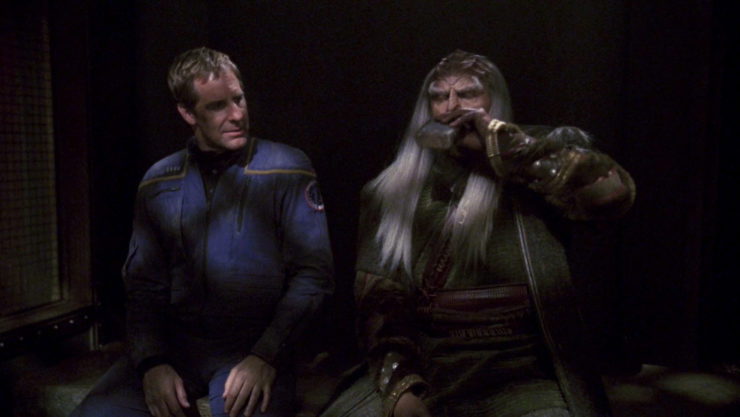
Welcome aboard. The main guests here are two Trek veterans as the two lawyers: J.G. Hertzler as Kolos and John Vickery as Orak. Hertzler had the recurring role of Martok on DS9 (and, sort of, on LD) and has played various other roles on DS9, Voyager, Enterprise, and LD, including another Klingon he’ll play in “Borderland.” Vickery played a Betazoid in TNG’s “Night Terrors” and had the recurring role of Rusot on DS9.
In addition, Granville Van Dusen plays the magistrate (he’ll be back as an Andorian in “Proving Ground”), Daniel Riordan plays Duras (he’ll be back in the same role in “The Expanse,” and he previously played a Zaldan in TNG’s “Coming of Age” and a Bajoran in DS9’s “Progress”), Victor Talmadge plays the refugee leader, and Helen Cates plays Duras’ first officer.
Trivial matters: Both Klingon tribunals and the prison planet of Rura Penthe were established in The Undiscovered Country. While Rura Penthe hasn’t been seen onscreen again since, it was part of the script of the 2009 Star Trek as where Nero and his crew were imprisoned after they came through to the alternate timeline of that film, but those scenes were cut. The comic book Nero by Roberto Orci, Alex Kurtzman, Tim Jones, Mike Johnson, & David Messina detailed Nero’s crew’s time on that prison planet. Rura Penthe is also seen in Federation: The First 150 Years by David A. Goodman (the scripter of this episode), Destiny: Lost Souls by David Mack, and the games Klingon Honor Guard and Star Trek Online.
Though it’s never spoken in dialogue, the script establishes the trial as taking place on Narendra III, which is a Klingon world that another ship called Enterprise will be seen defending from a Romulan attack in TNG’s “Yesterday’s Enterprise.”
Neither Kolos nor Orak have been seen onscreen since. However, Federation: The First 150 Years establishes that Orak went on to become chancellor of the Klingon High Council later in life, while the Romulan War novels by Michael A. Martin establish that Kolos survived his sentence and continued his work to advocate for a return to honor for the empire. The Klingon Empire Core Rulebook published by Star Trek Adventures (to which your humble rewatcher contributed) establishes that Kolos’ sentence was commuted to nine months and he afterward became a magistrate.
Kolos cites the Judicial Charter of Koloth, which was presumably drafted by an ancestor of the Klingon played by William Campbell that we met in the original series’ “The Trouble with Tribbles,” the animated episode “More Tribbles, More Troubles,” and DS9’s “Blood Oath.”
Goodman named Orak after the super-computer ORAC from Blake’s 7.
Duras is intended to be an ancestor of the twenty-fourth century characters Duras (TNG’s “Sins of the Father” and “Reunion”), Lursa, B’Etor (TNG’s “Redemption” two-parter and “Firstborn,” DS9’s “Past Prologue,” Generations), and Toral (TNG’s “Redemption,” DS9’s “Sword of Kahless”). His crest has the same design as the other four.
Duras’ ship is the Bortas, which means “revenge.” That will be a ship name for another Klingon vessel in TNG’s “The Defector,” “Redemption,” and “Rightful Heir.” His new assignment is to Ty’Gokor, a Klingon world established in DS9’s “Apocalypse Rising.”
Kolos’ concerns about the stagnation and corruption of the Klingon Empire will be echoed a century hence by T’Kuvma in Discovery’s “The Vulcan Hello.”
That the Klingon Empire has a rigid class system was established in DS9’s “Once More Unto the Breach.”
T’Pol’s past in the Vulcan Ministry of Security was established in “The Seventh.”
The refugees are not named in the episode, but according to production notes are called the Arin’Sen. They haven’t been seen since.
Xenopolycythemia is a fatal disease that was first mentioned in the original series’ “For the World is Hollow and I Have Touched the Sky.”
Archer brought Klaang back to the High Council with vital intelligence in “Broken Bow.” Enterprise rescued the Somraw in “Sleeping Dogs.”
Archer mentions that Earth suffered three world wars. World War III has been a part of Trek’s Earth history since the original series (“Space Seed” and “The Savage Curtain,” as well as TNG’s “Encounter at Farpoint,” First Contact, Voyager’s “In the Flesh,” Enterprise’s “In a Mirror, Darkly, Part II,” Discovery’s “New Eden,” SNW’s “Strange New Worlds,” etc.).
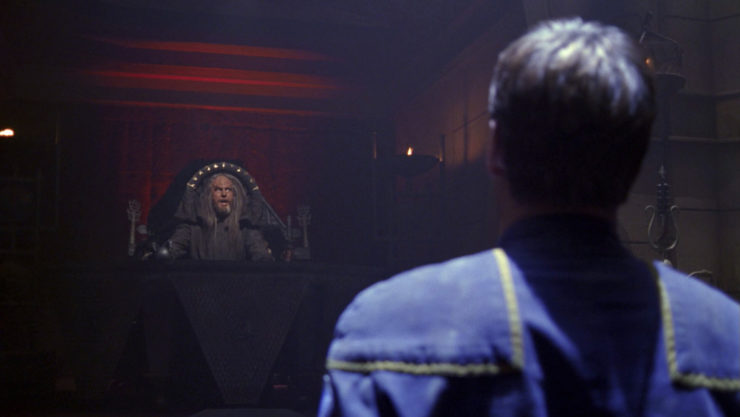
It’s been a long road… “They promised me a trial before the execution.” I’ve always had a deep, abiding love of Klingons, going back to when I watched the original series as a kid, and the characters of Kor and Kang in particular created a tremendous impression on me. I have gone on to write quite a bit of Klingon fiction in the Trek universe, and have done a great deal of work developing the Klingon culture in the ancillary fiction of prose, comics, and role-playing games.
So it shouldn’t surprise anyone that I adore this episode.
This is for several reasons, but the main thing is that it addresses one of the lacks of the prior portrayals of Klingons onscreen: the consistent casting of the Klingon Empire as a “warrior culture.” This is nonsense, of course—the Klingon Empire is a star-spanning nation, one that is considered one of the super-powers of this section of the galaxy. That cannot possibly happen if everyone is a warrior.
But this episode finally codifies what was implied but never stated by those previous stories: warriors have the highest rank and consideration in Klingon society. They’re the aristocrats, the elite. But there are other Klingons who do all the other, less violent tasks that actually keep the empire going.
We see three of them here in Kolos, Orak, and the magistrate, and the casting department deserves tremendous credit here. J.G. Hertzler, John Vickery, and Granville Van Dusen are three actors with magnificent voices and a tremendous sense of gravitas.
Van Dusen’s magistrate is the toughest job here, because he has to be a hard-ass while still having at least a vestige of honor and consideration for the rule of law. And, of course, he has to follow the way the High Council is blowing, which is right in Archer’s face…
Vickery is stupendous as always, using his great voice and superlative line deliveries to give us a prosecutor who wields rhetoric with verve and talent, manipulating the proceedings with his words.
And then there’s Hertzler, who never fails to be amazing in every role he’s played on Trek. With all due respect to Martok, Kolos may be my favorite role of his, only because you get such a great sense of the character’s age, and the weight of his reduced role in Klingon society due to a lack of caring about justice. When we first see him, he’s almost as bad as Kovat, the conservator who “defended” O’Brien in DS9’s “Tribunal,” which was even more of a show trial than this—going through the motions, steering the trial toward the predetermined outcome. But the more he talks to Archer, the more he remembers the good old days, and Hertzler does a wonderful job of showing Kolos gaining confidence and outrage as he reverts to his old self in the best way.
Okay, we’re on the ninth paragraph, and I’ve barely talked about the actual stars of the show. And there’s not much to say. Aside from Scott Bakula, the main cast is barely even in it. Truly, this is a story about the evolution of the Klingon Empire and an examination of the society of the Klingon people, giving us a new look at one of Trek’s most venerable alien species while utilizing several familiar elements, particularly from The Undiscovered Country. This story would work with pretty much any generic human ship captain—which is handy, as there is no more human ship captain more generic than Jonathan Archer…
Warp factor rating: 10
Keith R.A. DeCandido has a very lengthy history of writing Klingons, starting with his very first Trek novel, the 2001 TNG novel Diplomatic Implausibility, and also including the four novels focusing on the crew of the I.K.S. Gorkon from 2003-2008, the comic Alien Spotlight: Klingons in 2009, short fiction in Tales from the Captain’s Table in 2005 and Seven Deadly Sins in 2010, the reference book The Klingon Art of War in 2014, material for the Star Trek Adventures Klingon Empire Core Rulebook in 2020, and the forthcoming STA adventure Incident at Kraav III (written with Fred Love), among many others.










